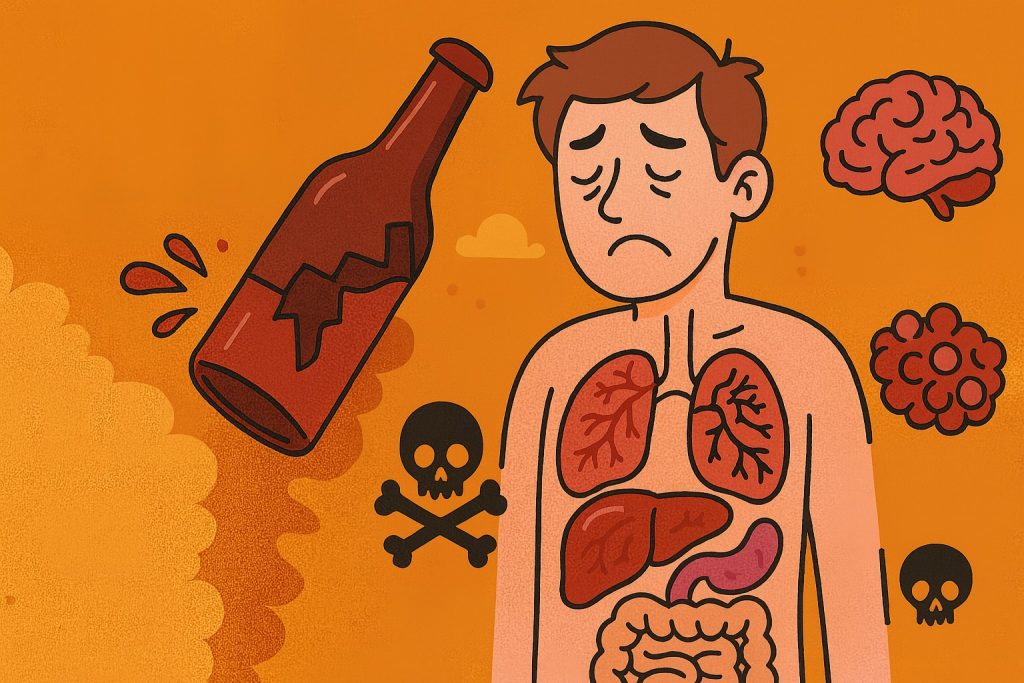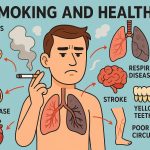Alcohol, especially in the form of ethanol, is widely accepted in many cultures, but its effects on the human body are deeply damaging. It’s classified by the World Health Organization as a Group 1 carcinogen — the same category as tobacco and asbestos. Although moderate use may seem harmless, regular or heavy alcohol consumption leads to a wide range of chronic, progressive, and often irreversible diseases.
The Brain: Rewiring Your Identity
Alcohol acts as a central nervous system depressant, altering brain chemistry from the first sip. Over time, it:
- Damages neurons and shrinks brain volume
- Impairs decision-making, memory, and coordination
- Increases the risk of depression, anxiety, and cognitive decline
- Leads to addiction by reshaping dopamine and serotonin pathways
Chronic alcohol use also triggers alcohol-related dementia and permanent personality changes.
The Liver: A Failing Filter
The liver is the body’s detox center — and alcohol pushes it to the limit. Even small amounts cause liver cells to die. In time, alcohol can lead to:
- Fatty liver disease (steatosis)
- Alcoholic hepatitis
- Cirrhosis – permanent liver scarring and failure
- Liver cancer
The liver becomes less able to process toxins, leading to widespread poisoning of other organs.
The Heart and Blood Vessels: Accelerated Wear and Tear
Alcohol increases the risk of:
- Hypertension (high blood pressure)
- Heart rhythm disorders (arrhythmias)
- Cardiomyopathy – weakening of the heart muscle
- Heart attacks and strokes
Any intake over years can significantly increase the risk of cardiovascular death.
Cancer: A Deadly Link
Alcohol is linked to at least seven types of cancer, including:
- Mouth, throat, and esophagus
- Liver
- Colorectal
- Breast (even with low intake)
Its byproduct, acetaldehyde, damages DNA and impairs cellular repair — a direct route to tumor formation.
The Immune System and Hormones: Silent Sabotage
Alcohol weakens the immune system, making the body more vulnerable to:
- Infections
- Slow wound healing
- Autoimmune reactions
It also disturbs hormonal balance, reducing testosterone, altering insulin function, and harming reproductive health.
Digestive and Pancreatic Damage
Alcohol irritates the stomach lining, causing:
- Gastritis and ulcers
- Pancreatitis, a potentially fatal inflammation
- Nutrient malabsorption, leading to vitamin deficiencies and weight loss
The pancreas may begin self-digesting, releasing deadly enzymes into the bloodstream.
How It Kills
Alcohol-related deaths can occur through:
- Liver failure
- Heart failure or stroke
- Cancer
- Car accidents, violence, or suicide
- Alcohol poisoning from acute overconsumption
Globally, alcohol contributes to 3 million deaths annually — one every 10 seconds.
Glossary
- Ethanol – The active ingredient in alcoholic drinks, toxic in large amounts
- Cirrhosis – Permanent scarring of the liver
- Acetaldehyde – A carcinogenic byproduct of alcohol metabolism
- Pancreatitis – Inflammation of the pancreas, often caused by alcohol
- Cardiomyopathy – A disease of the heart muscle


